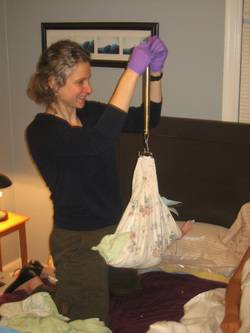Birth Choices in Oregon

As of 2012, Oregon has very few laws regarding birth, which means most families are able to find a birth option which works well for them.
All types of midwifery, physican care and unassited childbirth are all legal within the state of Oregon. There are also several freestanding birth centers, and many of the local hospitals have specific wards called "in hospital birth centers” which cater to women looking for low intervention deliveries.
For professional prenatal and birth care providers, you can choose from Midwives, Naturopaths and Physicians.
All types of midwifery, physican care and unassited childbirth are all legal within the state of Oregon. There are also several freestanding birth centers, and many of the local hospitals have specific wards called "in hospital birth centers” which cater to women looking for low intervention deliveries.
For professional prenatal and birth care providers, you can choose from Midwives, Naturopaths and Physicians.
Midwives

In Oregon, midwives generally attend low-risk women, the definition of which can vary widely among care providers. Be sure you discuss what situations you would “risk out” with any midwife or birth center you are considering. At the present time midwifery licensure is optional and many midwives have chosen not to be licensed through the State of Oregon.
Direct Entry Midwives (DEMs): operate under the assumption that birth is not a medical event, but a life event and as such follow the Midwifery Model of Care, which assumes healthy women do not need the assistance of doctors or a hospital setting to deliver a child safely. DEMs attend home and birth center births. Most DEMs are trained to handle most normal birth and pregnancy situations. There are no legal requirements in Oregon for the practice of direct entry midwifery, although a DEM may choose to become licensed through the state at this time, which carries certain requirements for what kind of births the midwife can attend, as well as a standard for training receivied. DEMs do not give pain medication, epidurals or perform cesarean sections. If there is a complication during the pregnancy or during labor and delivery, the midwife will usually arrange a hosptial or care provider transfer.
Certified Professional Midwives (CPMs), A CPM is a direct entry midwife who has requirements for certification from the National Association of Registered Midwives, or NARM Like DEMs, CPMs follow the Midwifery Model of Care and attend home and birth center births. For information on the requirements for CPM certification, click here. CPMs do not give pain medication, epidurals or perform cesarean sections. If there is a complication during the pregnancy or during labor and delivery, the midwife will usually arrange a hosptial or care provider transfer.
Licensed Professional Midwives, Licensed Direct Entry Midwives (LPMs & LDMs): A LDM is a direct entry midwife who has completed the requirements for licensure through the State of Oregon. LDMs follow the Midwifery Model of Care and attend home and birth center births. To read about the legal requirements for licensure of Direct Entry Midwives in Oregon, click here. LPMs & LDMs do not give pain medication, epidurals or perform cesarean sections. If there is a complication during the pregnancy or during labor and delivery, the midwife will usually arrange a hosptial or care provider transfer.
Certified Nurse Midwives (CNMs): A CNM is a midwife who holds a Master’s Degree in Nurse Midwifery and has passed the requisite boards, which are administered nationally. Oregon CNMs are governed by the Oregon Chapter of the National Association of Nurse Midwives. CNMs follow the Midwifery Model of Care although most do so in a hospital setting and can prescribe IV drugs such as pitocin. CNMs almost always work with OB/GYNs and most have hospital privileges. If a cesarean section is indicated, the CNM will not perform the surgery, but will most likely attend to you during the birth.
Direct Entry Midwives (DEMs): operate under the assumption that birth is not a medical event, but a life event and as such follow the Midwifery Model of Care, which assumes healthy women do not need the assistance of doctors or a hospital setting to deliver a child safely. DEMs attend home and birth center births. Most DEMs are trained to handle most normal birth and pregnancy situations. There are no legal requirements in Oregon for the practice of direct entry midwifery, although a DEM may choose to become licensed through the state at this time, which carries certain requirements for what kind of births the midwife can attend, as well as a standard for training receivied. DEMs do not give pain medication, epidurals or perform cesarean sections. If there is a complication during the pregnancy or during labor and delivery, the midwife will usually arrange a hosptial or care provider transfer.
Certified Professional Midwives (CPMs), A CPM is a direct entry midwife who has requirements for certification from the National Association of Registered Midwives, or NARM Like DEMs, CPMs follow the Midwifery Model of Care and attend home and birth center births. For information on the requirements for CPM certification, click here. CPMs do not give pain medication, epidurals or perform cesarean sections. If there is a complication during the pregnancy or during labor and delivery, the midwife will usually arrange a hosptial or care provider transfer.
Licensed Professional Midwives, Licensed Direct Entry Midwives (LPMs & LDMs): A LDM is a direct entry midwife who has completed the requirements for licensure through the State of Oregon. LDMs follow the Midwifery Model of Care and attend home and birth center births. To read about the legal requirements for licensure of Direct Entry Midwives in Oregon, click here. LPMs & LDMs do not give pain medication, epidurals or perform cesarean sections. If there is a complication during the pregnancy or during labor and delivery, the midwife will usually arrange a hosptial or care provider transfer.
Certified Nurse Midwives (CNMs): A CNM is a midwife who holds a Master’s Degree in Nurse Midwifery and has passed the requisite boards, which are administered nationally. Oregon CNMs are governed by the Oregon Chapter of the National Association of Nurse Midwives. CNMs follow the Midwifery Model of Care although most do so in a hospital setting and can prescribe IV drugs such as pitocin. CNMs almost always work with OB/GYNs and most have hospital privileges. If a cesarean section is indicated, the CNM will not perform the surgery, but will most likely attend to you during the birth.
Physicans

Obstetrician/Gynecologist (OBGYNs): These are Medical Doctors who hold a Doctorate degree in medicine, and have additional surgical expertise in the field of obstetrics and gynecology. OBGYNs follow a pathology based approach which is typical in Western Medicine. An OBGYN will be knowledgeable in the diseases surrounding pregnancy and childbirth and will have a set standard of care regarding each issue. If a mother has compounding medical issues, she may be referred to a perinatologist who specializes in high risk pregnancies. The current standard of care for most OBGYNs is geared towards an induction and/or elective cesarean section for the following conditions: preeclampsia, macrosomia, breech position, or gestation longer than 42 weeks.
Family Practice Doctor (MDs): These are Medical Doctors who hold a Doctorate degree in medicine. MDs follow a pathology based approach which is typical in Western Medicine. A family doctor will have training in typical deliveries and may be very knowledgeable about birth, especially if they have been in practice for 10 years or more.
Naturopaths (NDs): Naturopaths are Naturopathic Physician who holds a Doctorate degree of Naturopathic Medicine and are allowed to attend births in Oregon if they have obtained a certificate of Special Competency In Natural Childbirth from the Oregon Board of Naturopathic Examiners, per ORS.685.135. Naturopaths follow the Naturopathic Medicine model of care. Naturopaths typically are in private practice unaffiliated with a hospital and may have a birthing suite in their offices. Naturopaths may attend homebirths, but it is not very common.
Family Practice Doctor (MDs): These are Medical Doctors who hold a Doctorate degree in medicine. MDs follow a pathology based approach which is typical in Western Medicine. A family doctor will have training in typical deliveries and may be very knowledgeable about birth, especially if they have been in practice for 10 years or more.
Naturopaths (NDs): Naturopaths are Naturopathic Physician who holds a Doctorate degree of Naturopathic Medicine and are allowed to attend births in Oregon if they have obtained a certificate of Special Competency In Natural Childbirth from the Oregon Board of Naturopathic Examiners, per ORS.685.135. Naturopaths follow the Naturopathic Medicine model of care. Naturopaths typically are in private practice unaffiliated with a hospital and may have a birthing suite in their offices. Naturopaths may attend homebirths, but it is not very common.

